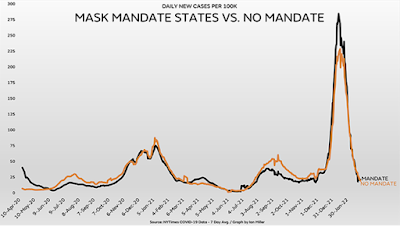 |
| Spot the difference? New York Times study of 11 US states that had mask mandatres, vs the 39 which didn’t. |
A while ago I concluded the same. To wit: masks work (lab testing proves it), yet on a large scale, as in mask mandates, they don’t seem to work. My theory is based on the fact that masks are tested in the lab, and there are various levels of efficacy. Cloth masks block around 10% of covid virus particles; surgical masks block 30% to 50%, and N95 masks block up to 95%. But that practice is different.
If you have a hyper-contagious virus, even 5% escape, let alone 90% escape, is enough to transmit the virus. That’s what accounts for the difference, I suggest, for why masks work in the lab, but don’t work in real life. (By the way, N95 masks are NOT recommended by our own hyper-safety conscious experts, because of the CO2 inhalation issue).
David Leonhardt in last week’s New York Times comes to a similar conclusion:
The evidence suggests that broad mask mandates have not done much to reduce Covid caseloads over the past two years. Today, mask rules may do even less than in the past, given the contagiousness of current versions of the virus. And successful public health campaigns rarely involve a divisive fight over a measure unlikely to make a big difference.
He thinks the difference is because people don’t wear masks properly (true) and then take masks off indoors to eat or drink (also true) and that this window allows the spread of a virus that’s hyper contagious.
Take these two observations together -- people not wearing masks properly and continuously, together with my observation that even a small amount of escape is enough for transmission -- and you end up with the answer to his headline: why masks work (in the lab) but mandates don’t work (because folks are fallible and the virus is super catching).
So there you have it. From the New York Times, which has from the beginning of the pandemic been a supporter of the “quicker, harder, deeper” lockdown narrative, including being super keen on masking. Now they see the data, which don’t support mandates. Good on the Times for having the integrity to publish this. It goes against a masking narrative, that it’s everywhere good, and everywhere effective. It’s simply not.
Leonhardt doesn’t mention specific examples of how mandates don’t work. Here are some:
- The UK. England has had no mandates at all for nearly a year. Scotland, N. Ireland and Wales all have had, and continue, mandates. Scotland especially strict. The figures for hospitalisation and deaths are no different. In some cases, England is doing better.
- A study in Kansas: in 2020 24 of its counties had mask mandates; 81did not. Result: sometimes the counties with no mandate did better (measured by new cases), sometimes they did worse, but overall the effect was negligible.
- A study of US states: some with, some without mandates. Result: imperceptible difference. (if anything those without mask mandates performed slightly better)
Leonhard’s fair point is: if masks made a difference on a macro level, you’d see it in the data. But we don’t. Contrast that with the efficacy of vaccines. They have quickly and clearly reduced deaths, clearly seen in the data.
Leonhardt proposes a compromise: those who want to wear a mask do so. Those that don’t don’t. That’s the way it’s been in hospitals forever. We patients didn’t wear masks. The doctors and nurses did.
Meantime: in our ongoing Hong Kong idiocy, we have a member of our very own Gang of Four medical experts who have our government and the South China Morning Post in their thrall, professor Yuen Kwok-yung head of infectious diseases at HKU, says we ought to mask forever. Because it’ll help reduce the flu. I was worried about this at the beginning, that there’d be mission creep and people would suggest we wear masks to stop the flu, but I thought, I hoped, that common sense would prevail. No such luck.